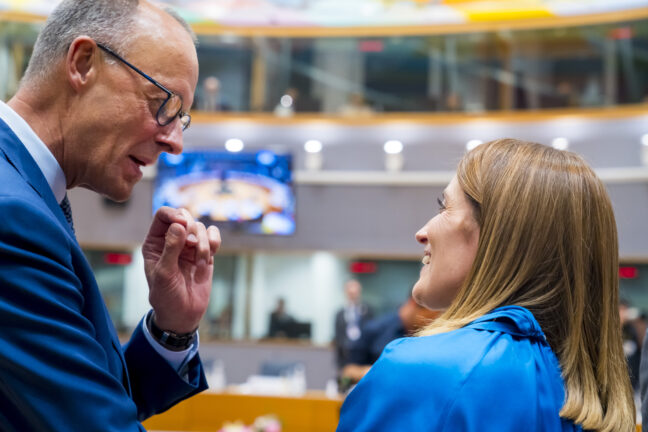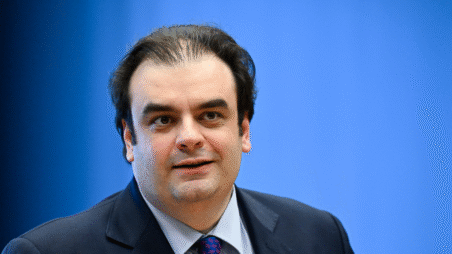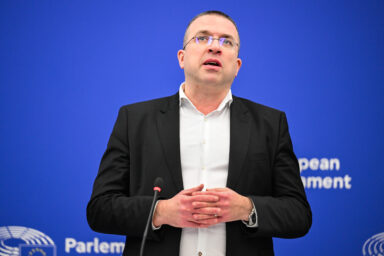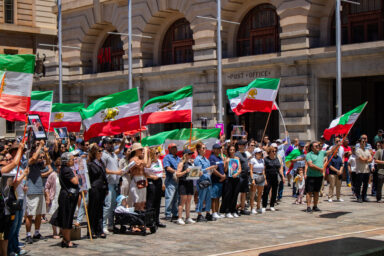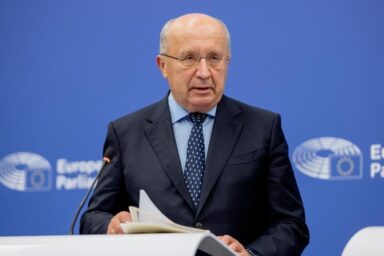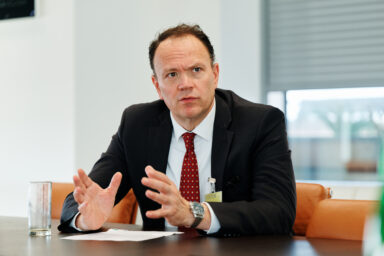Roberta Metsola, President of the European Parliament, was busy on Thursday unpacking a tension between the European Union’s two co-legislating bodies, the Parliament and the Council. The tension centered on whether national leaders can lecture a democratically elected assembly on its choices.
The immediate spark came after Wednesday’s vote in Strasbourg, in which the Parliament failed to reach a position on Omnibus I, a business simplification package. National leaders, wary of protracted parliamentary deadlock expressed alarm. Upon his arrival to Thursday’s meeting of the European Council, Friedrich Merz, Germany’s Bundeskanzler, described the vote as “unacceptable“.
Needless to say, the statement would see Ms Metsola fielding questions from members of the press as to how she felt about a premier apparently disinclined to accept the result of a parliamentary vote. The EP president insisted on her institution’s independence. “I would not question the democratic independence and the institutional prerogative of the Parliament to defend its position and represent to represent the citizens as we are elected to do directly,” she said.
A delicate mission
Ms Metsola also framed her role as builder‑in‑chief—someone who must weld factions into working majorities, stressing pragmatism over purity. “For a huge chunk of the parliament, that was not far enough. And for another part of the parliament, it went too far. So we will need to find somewhere in the middle.” She promised work to find that middle ground in the coming weeks.
Facing a delicate diplomatic task, Ms Metsola did not flinch. She described lengthy, “in‑depth discussions with all the heads of state and government” and said many leaders understood the parliamentary dynamic. “There is also a recognition of the fact that this is a democratically elected institution with 720 individuals,” she said, invoking the sheer size and pluralism of the chamber.
You might be interested
She leaned on a simple point about majorities. Parliaments need to build them. “Parliaments depend on the building of majorities, where the difference is that we don’t have government majorities here,” she explained. She contrasted the European Parliament’s pluralism with the national parliaments where prime ministers can drive policy without such bargaining (most of the time).
Coordination not capitulation
Ms Metsola invited the Council to help, not to command. She said she had asked prime ministers to “make sure that the members of the European Parliament of the country that they represent actually mirror the agenda that they are united about.” That appeal was procedural rather than submissive.
She promised to press political groups to close gaps. “This will require amendments, this will require a close negotiation between the groups that want to be fully on board.” She asked leaders to use their influence to persuade national delegations. “Especially because those who had spoken to their members delivered the votes yesterday, that they will bring larger numbers in support of important files,” she said.
She rejected the idea that the chamber showed a lack of political maturity. “It’s not about maturity, if anything, it’s about pragmatism,” she insisted. The tone was firm: the Parliament would not yield its sovereign choices, but it would seek usable compromises.
Repairing trust
Ms Metsola emphasised teamwork among the EU’s institutional leaders. She described close cooperation “between myself, President Costa, and President von der Leyen” as essential for finding landing zones. She argued coordinated approaches would smooth frictions and avoid public rows.
She set a tight timetable. The Parliament will vote again in Brussels in a couple of weeks. “I gave them a timeline of what happens next, which means that we will vote in the next plenary session in Brussels just a couple of weeks away from today,” she said. She urged swift outreach to members.
I need to keep majorities working and I need to keep groups working in sync together and that is what i will keep on doing. — MEP Roberta Metsola (EPP/MLT), President of the European Parliament
She spoke of concrete files where cooperation should yield results—defence industry, agriculture and migration among them. “On the defense, we are moving very quickly. On uncoupling from Russian oil and gas, very smoothly,” she said. Her point was practical: some dossiers advance; others require more graft.
Majorities from the centre out
Ms Metsola returned repeatedly to her guiding method. “Majorities are always strongest from the centre out because we believe that this is the way to move Europe forward,” she said. The phrase encapsulated her attempt to nudge centre groups toward compromise and to bind them to a shared agenda.
She defended the Parliament’s recent votes as expressions of internal balance. “The omnibus showed that for a huge section of Parliament this compromise simply did not go far enough and that it would not have made things actually better, simpler or easier and for some of the other members any change was way too far,” she said. She framed the narrow vote as a symptom of diversity, not disorder.
I want to have the political will to find compromises. — Roberta Metsola
She also warned that rigid stances would stall business. “If this is not possible, I know that this House will deliver regardless,” she said. That line underscored the dual message: preserve principles, but work the system to get results.
A plea to national leaders
Ms Metsola asked prime ministers to act as honest brokers with their MEPs. “You all have your realities. You will need to see how what your government position is, if there is a position that is taken in national parliaments, could be in any way translated in the European Parliament,” she said. She acknowledged limits but called for practical help.
She described active goodwill from several leaders. “I can tell you I was very encouraged by the prime ministers who said that they will, especially because those who had spoken to their members delivered the votes yesterday, that they will bring larger numbers in support of important files.” She read that as a promise to mobilise support rather than to chastise.
Her approach was managerial. She said she would keep meeting groups and organisers. “I have a role, I have an institutional responsibility, I need to keep majorities working and I need to keep groups working in sync together and that is what i will keep on doing,” she said. The repeated reference to duty conveyed steadiness.
A test for democracy
Ms Metsola framed the episode as a routine, if awkward, test of EU democracy. She urged calm and effort—discussions, amendments, bridging work. “This is how I have always worked and that is what I will always work because I want to have the political will to find compromises,” she said.
She also linked procedural fixes to substance. Finding a workable middle will, she argued, let Brussels move on defence simplification, migration and the multiannual budget. Failure would only prolong wrangling. “We will need that in the next very difficult files coming ahead, not least the MFF,” she warned.
I am president of all the house, to be very clear. I represent 719 colleagues of mine. — Roberta Metsola
Her final note was modest and institutional. She said she represents all MEPs and that she would deploy her experience to keep the Parliament functioning. “I am president of all the house, to be very clear. I represent 719 colleagues of mine,” she reminded. The line was both a reminder of her remit and a call to collective responsibility.
The clash with national leaders has not gone away. But Ms Metsola’s message was clear: the Parliament will not be lectured into silence. It will be coaxed into compromise—and it will expect heads of government to help rather than to browbeat. The coming weeks will test whether institutions can repair trust without sacrificing democratic independence.
